 Libri di Zank su Unilibro.it
)
Libri di Zank su Unilibro.it
)
|
|
2009 |
 Title :
Storia dell'architettura italiana. Architettura romana. I grandi monumenti di Roma. Ediz. illustrata
Title :
Storia dell'architettura italiana. Architettura romana. I grandi monumenti di Roma. Ediz. illustrataAuthor: Hesberg H. von (cur.); Zanker P. (cur.) Publisher: Electa Dalla prima urbanizzazione di Roma a villa Adriana: quello che due dei massimi storici dell'architettura antica hanno progettato è un volume che copre l'intera storia che dalla formazione di Roma giunge all'epoca della sua massima gloria, testimoniata da monumenti che hanno contribuito a modellare la cultura dell'Occidente. A questa impresa editoriale hanno collaborato i migliori studiosi internazionali. Il volume che hanno contributo a realizzare e che ora presentiamo allarga in modo definitivo l'orizzonte della collana 'Storia dell'architettura italiana', preludendo a quelli che nei prossimi anni guideranno i lettori attraverso i secoli che separano la caduta dell'Impero Romano dal Quattrocento. Nel libro si intrecciano i capitoli di un racconto che non lascia scoperto alcun aspetto della storia su cui von Hesberg e Zanker hanno puntato l'attenzione del progetto di ricerca da loro elaborato. A quelli dedicati alla primitiva urbanizzazione della città fanno seguito i saggi dedicati alla Roma di Cesare e di Augusto, alle grandi basiliche (Massenzio, Emilia, Giulia), al teatro di Marcello e al Colosseo, al Pantheon. € 119,00
Scontato: € 113,05
|
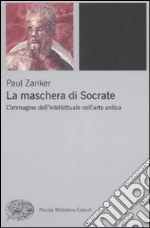 Title :
La maschera di Socrate. L'immagine dell'intellettuale nell'arte antica
Title :
La maschera di Socrate. L'immagine dell'intellettuale nell'arte anticaAuthor: Zanker Paul Publisher: Einaudi Cittadino esemplare o eroe dell'intelletto, rappresentante della tradizione o guida in mezzo alle nuove inquietudini spirituali: i modi in cui si presenta l'intellettuale antico sono caratterizzati da una varietà di volti e sfaccettature che trovano esatta corrispondenza nella molteplicità dei ruoli che di volta in volta egli è chiamato a svolgere. In un percorso che parte dall'Atene di età classica per approdare alle grandi trasformazioni occorse nella tarda antichità, Paul Zanker interroga le effigi di Omero e di Menandro, di Cicerone e di Marco Aurelio (ma anche di Cameade o di Cristo), trattandole a tutti gli effetti alla stregua di fonti storiche: non, quindi, come riproduzioni 'fotografiche' atte a soddisfare la curiosità di vedere quale fosse la fisionomia dei grandi personaggi del passato, ma come visualizzazioni di valori e di ideali diffusi, testimonianze dell'evolversi del concetto di 'cultura' a seconda delle epoche e dei contesti sociali. € 38,00
|
|
2008 |
 Title :
Think BIG
Title :
Think BIGAuthor: Trump Donald, Zanker Bill Publisher: Harperbusiness Donald J. Trump is an icon: the very definition of the American success story. The star of The Apprentice and developer of some of the planet's most prestigious real estate, he's been on the bottom and risen to become one of the world's wealthiest men. Bill Zanker started The Learning Annex with $5,000 and grew it into a $5 million a year company. That was before he met Donald Trump. Thirty months later, after Zanker learned to think BIG himself, The Learning Annex is generating over $100 million a year in sales—and still growing. Together, they're living examples of how thinking BIG and knowing when to back up your opinions aggressively—regardless of what your critics or opponents might say—can help you maximize your personal and professional achievements. For the first time ever, you too can learn Trump's secrets to thinking BIG! Learn:
€ 15,20
|
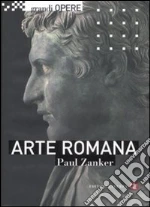 Title :
Arte romana. Ediz. illustrata
Title :
Arte romana. Ediz. illustrataAuthor: Zanker Paul; La Monica M. (cur.) Publisher: Laterza Come definire l'arte romana e, soprattutto, quando fissarne l'inizio? Possono considerarsi romane le opere create a Roma e per Roma dal VI al IV secolo a.C., o sono ancora espressioni dell'arte etrusca, riferibili a una generale arte italica? E come comportarsi con la stragrande maggioranza dei generi artistici romani, che perlopiù copiano o adattano analoghi generi greci? 'Dell'arte romana ci interessano soprattutto il contesto storico e i messaggi delle immagini: non più l'arte come una dimensione autarchica, quanto piuttosto come medium della comunicazione sociale. Con un approccio di questo tipo, le immagini vengono intese come elemento integrato di una cultura definita in senso antropologico'. Secondo questa prospettiva diventa naturale fissare un inizio orientativo dell'arte romana nel momento in cui essa sviluppa le sue caratteristiche specifiche, in risposta a una meglio definita organizzazione sociale e politica. Tale momento coincide con la trasformazione dello Stato al sorgere dell'Imperium romanum. L'ellenizzazione che andò di pari passo con la conquista delle città e delle monarchie greche modificò radicalmente le strutture politiche e sociali. € 29,00
|
|
2007 |
 Title :
Modes of Viewing in Hellenistic Poetry and Art
Title :
Modes of Viewing in Hellenistic Poetry and ArtAuthor: Zanker Graham Publisher: Univ of Wisconsin Pr Taking a fresh look at the poetry and visual art of the Hellenistic age, from the death of Alexander the Great in 323 B.C. to the Romans’ defeat of Cleopatra in 30 B.C., Graham Zanker makes enlightening discoveries about the assumptions and conventions of Hellenistic poets and artists and their audiences. Zanker’s exciting new interpretations closely compare poetry and art for the light each sheds on the other. He finds, for example, an exuberant expansion of subject matter in the Hellenistic periods in both literature and art, as styles and iconographic traditions reserved for grander concepts in earlier eras were applied to themes, motifs, and subjects that were emphatically less grand. € 29,00
|
 Title :
Think Big and Kick A... in Business & Life (CD Audiobook)
Title :
Think Big and Kick A... in Business & Life (CD Audiobook)Author: Trump Donald, Zanker Bill Publisher: Harperaudio Donald J. Trump is an icon: the very definition of the American success story. The star of The Apprentice and developer of some of the planet's most prestigious real estate, he's been on the bottom and risen to become one of the world's wealthiest men. Bill Zanker started The Learning Annex with $5,000 of his own money. After meeting Donald Trump, Zanker learned to Think BIG himself and grew The Learning Annex from a $5 million a year company into one that's generating over $100 million a year in sales—and still growing. For the first time ever, you too can learn Trump's secrets to thinking BIG and kicking ass! Learn:
€ 26,80
|
 Title :
Think Big and Kick Ass in Business and Life
Title :
Think Big and Kick Ass in Business and LifeAuthor: Trump Donald, Zanker Bill Publisher: Harperluxe Donald J. Trump is an icon: the very definition of the American success story. The star of The Apprentice and developer of some of the planet's most prestigious real estate, he's been on the bottom and risen to become one of the world's wealthiest men. Bill Zanker started The Learning Annex with $5,000 of his own money. After meeting Donald Trump, Zanker learned to Think BIG himself and grew The Learning Annex from a $5 million a year company into one that's generating over $100 million a year in sales?and still growing. For the first time ever, you too can learn Trump's secrets to thinking BIG and kicking ass! Learn:
€ 24,10
|
|
2006 |
 Title :
Globalisation - Cultures - Religions / Globalisierung - Kulturen - Religionen
Title :
Globalisation - Cultures - Religions / Globalisierung - Kulturen - ReligionenAuthor: Ozankom Claude (EDT), Udeani Chibueze (EDT) Publisher: Brill Rodopi € 102,90
|
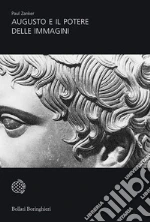 Title :
Augusto e il potere delle immagini
Title :
Augusto e il potere delle immaginiAuthor: Zanker Paul Publisher: Bollati Boringhieri Intrecciando storia, archeologia, filologia e analisi delle opere d'arte e letterarie, Zanker ricostruisce qui il progetto dell'imperatore Augusto con un geniale uso propagandistico di immagini e simboli, di restituire un'identità politica e morale ai romani, dopo la crisi dell'età tardo repubblicana. Egli mostra 'come un mutamento del sistema politico possa condurre allo sviluppo di un nuovo linguaggio visivo, che riflette e nello stesso tempo condiziona in modo essenziale l'evoluzione della mentalità'; e come il successo di questo programma di rinnovamento augusteo e il frutto di perfetto sistema di propaganda: 'Le immagini dei poeti e degli artisti parlano di un mondo felice, in cui un grande sovrano governa in pace un impero universale. E come dimostra non da ultimo la pubblicità, che continua a utilizzarle, alcune di queste immagini conservano ancora intatto il proprio potere di suggestione'. € 24,00
Scontato: € 22,80
|
|
2002 |
 Title :
Un'arte per l'impero. Funzione e intenzione delle immagini nel mondo romano. Ediz. illustrata
Title :
Un'arte per l'impero. Funzione e intenzione delle immagini nel mondo romano. Ediz. illustrataAuthor: Zanker Paul; Polito E. (cur.) Publisher: Electa Gli studi di Zanker sono dedicati in particolare all'arte e alla civiltà del mondo ellenistico e romano, dalla tarda repubblica all'impero. La sua ricerca, fondata su un'analisi del mondo classico, indaga le opere dell'arte antica sia nelle forme decorative sia nelle rappresentazioni individuali, per far luce sui valori condivisi della società, sulle aspirazioni e il gusto delle classi, sui mutamenti delle prospettive culturali. € 35,00
|
|
|
2000 |
 Title :
Negotiating Commercial Real Estate Leases
Title :
Negotiating Commercial Real Estate LeasesAuthor: Zankel Martin I. Publisher: Mesa House Pub € 15,80
|
|
|
1999 |
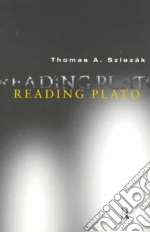 Title :
Reading Plato
Title :
Reading PlatoAuthor: Szlezak Thomas Alexander, Zanker Graham (TRN) Publisher: Routledge Reading Plato offers a concise and illuminating insight into the complexities and difficulties of the Platonic dialogues, providing an invaluable text for any student of Plato's philosophy. Taking as a starting point the critique of writing in the Phaedrus -- where Socrates argues that a book cannot choose its reader nor can it defend itself against misinterpretation -- Reading Plato offers solutions to the problems of interpreting the dialogues. In this ground-breaking book, Thomas A. Szlezak persuasively argues that the dialogues are designed to stimulate philosophical enquiry and to elevate philosophy to the realm of oral dialectic. € 39,30
|
 Title :
Pompeii
Title :
PompeiiAuthor: Zanker Paul, Schneider Deborah Lucas (TRN) Publisher: Harvard Univ Pr Pompeii's tragedy is our windfall: an ancient city fully preserved, its urban design and domestic styles speaking across the ages. This richly illustrated book conducts us through the captured wonders of Pompeii, evoking at every turn the life of the city as it was 2,000 years ago. When Vesuvius erupted in 79 A.D. its lava preserved not only the Pompeii of that time but a palimpsest of the city's history, visible traces of the different societies of Pompeii's past. Paul Zanker, a noted authority on Roman art and architecture, disentangles these tantalizing traces to show us the urban images that marked Pompeii's development from country town to Roman imperial city. Exploring Pompeii's public buildings, its streets and gathering places, we witness the impact of religious changes, the renovation of theaters and expansion of athletic facilities, and the influence of elite families on the city's appearance. Through these stages, Zanker adeptly conjures a sense of the political and social meanings in urban planning and public architecture. The private houses of Pompeii prove equally eloquent, their layout, decor, and architectural detail speaking volumes about the life, taste, and desires of their owners. At home or in public, at work or at ease, these Pompeians and their world come alive in Zanker's masterly rendering. A provocative and original reading of material culture, his work is an incomparable introduction to urban life in antiquity. € 42,50
|
|
1997 |
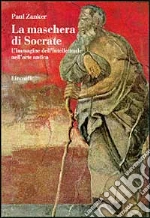 Title :
La maschera di Socrate
Title :
La maschera di SocrateAuthor: Zanker Paul Publisher: Einaudi Se i filosofi e oratori della Grecia classica sono cittadini della polis, e come tali rappresentanti per eccellenza delle virtù democratiche, in epoca ellenistica gli intellettuali vengono effigiati come guide spirituali, a volte insieme ai loro allievi, cui insegnano come vivere lontano dai dolori e dalle passioni della vita pubblica. Con un lavoro di analisi e raffronto all'interno di un materiale documentario ricco e variegato, l'autore intende offrire una ricostruzione dei contesti sociali, che mostra come i ritratti degli intellettuali, lungi dall'essere tentativi di riproduzione realistica di fisionomie celebri, siano rappresentativi degli universi culturali cui appartengono, riflettendone aspirazioni, ideali, sistemi di valori. € 61,97
|
|
|
1996 |
 Title :
The Heart of Achilles
Title :
The Heart of AchillesAuthor: Zanker Graham Publisher: Univ of Michigan Pr € 32,90
|
|
|
1990 |
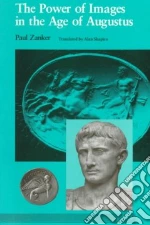 Title :
The Power of Images in the Age of Augustus
Title :
The Power of Images in the Age of AugustusAuthor: Zanker Paul Publisher: Univ of Michigan Pr Examines the imperial mythology that was reflected by Roman art and architecture during the rule of Augustus Caesar € 37,20
|
|
|
1984 |
 Title :
Il foro di Augusto
Title :
Il foro di AugustoAuthor: Zanker Paul Publisher: Palombi Editori € 6,20
|

|

|

|